|
ECMI Online Talk: "Can Minority Non-Territorial Autonomy Work in Practice?" 9 June 2021 (Flensburg, Germany) 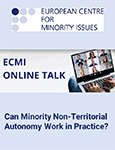 This online talk aims to explore potentials of
non-territorial autonomy (NTA), core practical challenges, and prospects for
better practical outreach (both widening and deepening) of the concept. It is
structured around four main topics: the nexus/tension between the territorial
and personal principles in the minority protection; labeling the concept as
“autonomy”; membership; and competences: NTA institutions as minority agents. The
panelists are prof. Zsuzsa Csergő, prof. Antonija Petričušić, prof. Levente
Salat and prof. David Smith. The online talk will be moderated by Dr. Ljubica
Djordjević and will take place via Zoom; please use this link to register for the event. For more details, see the ECMI website. This online talk aims to explore potentials of
non-territorial autonomy (NTA), core practical challenges, and prospects for
better practical outreach (both widening and deepening) of the concept. It is
structured around four main topics: the nexus/tension between the territorial
and personal principles in the minority protection; labeling the concept as
“autonomy”; membership; and competences: NTA institutions as minority agents. The
panelists are prof. Zsuzsa Csergő, prof. Antonija Petričušić, prof. Levente
Salat and prof. David Smith. The online talk will be moderated by Dr. Ljubica
Djordjević and will take place via Zoom; please use this link to register for the event. For more details, see the ECMI website.
World Autonomy Map is available online
22 April 2021 (Bolzano/Bozen, Italy)  The Centre for Autonomy Experience of Eurac Research developed a World Autonomy Map which reflects the content of our ongoing project. Based on Google Maps, it aims is to give an overview of existing territorial and non-territorial autonomies. The map provides for each case a set of basic information: demographic statistical data, official and spoken language(s), relevant legal documents. This is a map that is constantly being updated. The Centre for Autonomy Experience of Eurac Research developed a World Autonomy Map which reflects the content of our ongoing project. Based on Google Maps, it aims is to give an overview of existing territorial and non-territorial autonomies. The map provides for each case a set of basic information: demographic statistical data, official and spoken language(s), relevant legal documents. This is a map that is constantly being updated.
Launch of the Annual Webinar Series "Discussing World Autonomies" 10 March 2021 (Bolzano/Bozen, Italy)
 We are organising together with the Centre for Autonomy Experience an Annual Webinar Series called "Discussing World Autonomies". The goal is to share knowledge about autonomies worldwide, how they function and discussing the challenges they face. The topic of the 2021 webinar is "Autonomy and Sovereignty Conflict: Insights from Catalonia and Perspectives from Post-Brexit Scotland and Northern Ireland". You can watch this webinar online. We are organising together with the Centre for Autonomy Experience an Annual Webinar Series called "Discussing World Autonomies". The goal is to share knowledge about autonomies worldwide, how they function and discussing the challenges they face. The topic of the 2021 webinar is "Autonomy and Sovereignty Conflict: Insights from Catalonia and Perspectives from Post-Brexit Scotland and Northern Ireland". You can watch this webinar online.
European Parliament urges Ukraine to amend Constitution to recognize Crimean Tatar autonomy 11 February 2021 (Brussels, Belgium) 
The European Parliament has called on Ukraine "to adopt the laws on the indigenous peoples of Ukraine, on the status of the indigenous Crimean Tatar people, and on amending its Constitution to recognise the national-territorial autonomy of the Crimean Tatar people within Ukraine, and particularly Crimea, which stems from the inalienable right of the indigenous Crimean Tatar people to self-determination". This is stated in the European Parliament's draft resolution on the implementation of the Association Agreement between Ukraine and the European Union. Read more...
Coppieters Foundation announces launch of e-book on demands
for self-determination in the context of the European Union 16 December 2020 (Brussels, Belgium)  Coppieters Foundation published the e-book "Self-Determination in a Context of Shared Sovereignty. How to devise a European approach?". Today's challenge is how to devise an institutional set-up that could render the participation of subnational authorities in EU governance truly effective. The e-book gathers the contributions of two practitioners and eigth academics and aims to suggest out-of-the-box solutions for
all actors involved: the EU, States and national entities. You can download it here. Coppieters Foundation published the e-book "Self-Determination in a Context of Shared Sovereignty. How to devise a European approach?". Today's challenge is how to devise an institutional set-up that could render the participation of subnational authorities in EU governance truly effective. The e-book gathers the contributions of two practitioners and eigth academics and aims to suggest out-of-the-box solutions for
all actors involved: the EU, States and national entities. You can download it here.
Remote internship for the project "Autonomy Arrangements in the World" 29 October 2020 (Flensburg, Germany)  Are you a student looking for a remote internship? Are you interested in minority issues, human rights, political science and/or international law? Are you excited to learn new things and research skills? The European Centre for Minority Issues is looking for interns to assist remotely with our joint project. The main task of the internship is to conduct desk research and present literature review on the assigned topic. The internship lasts up to three months and is unpaid. The deadline for application is 20 November 2020. See all details here. Are you a student looking for a remote internship? Are you interested in minority issues, human rights, political science and/or international law? Are you excited to learn new things and research skills? The European Centre for Minority Issues is looking for interns to assist remotely with our joint project. The main task of the internship is to conduct desk research and present literature review on the assigned topic. The internship lasts up to three months and is unpaid. The deadline for application is 20 November 2020. See all details here.
New Center for Autonomy Experience of Eurac Research launched its online platform and e-learning course on "The Autonomy of South Tyrol"
20 October 2020 (Bolzano/Bozen, Italy)  Eurac Research launched its new Center for Autonomy Experience which focuses on activities and initiatives related to South Tyrolean autonomy and minority protection. The Center aims to share South Tyrol's experience and knowledge related to the autonomy, creating networks with international and local stakeholders. It produced an open access e-learning course on "The Autonomy of South Tyrol", which explains the history, the design and the most important legal aspects of the autonomy of South Tyrol through videos, short texts, charts quizzes, and supplementary reading material. Eurac Research launched its new Center for Autonomy Experience which focuses on activities and initiatives related to South Tyrolean autonomy and minority protection. The Center aims to share South Tyrol's experience and knowledge related to the autonomy, creating networks with international and local stakeholders. It produced an open access e-learning course on "The Autonomy of South Tyrol", which explains the history, the design and the most important legal aspects of the autonomy of South Tyrol through videos, short texts, charts quizzes, and supplementary reading material.
New Caledonia rejects independence from France for second time
4 October 2020 (Nouméa, France)  People in the French overseas territory of New Caledonia have narrowly rejected independence from France in a second referendum. New Caledonia enjoys a large degree of autonomy but depends on financial support from mainland France. Following bouts of violence in the 1980s over the issue of independence, the 1998 Noumea Accord set out a roadmap for greater autonomy for the territory. Under this agreement, New Caledonia is allowed up to three referendums on independence. The first took place in November 2018, where voters rejected independence from France by 56.4% to 43.6%, with a turnout of about 81%. Most indigenous Kanaks voted in favour of independence, while non-Kanaks - a majority of those descended from French settlers - voted against. Read more... People in the French overseas territory of New Caledonia have narrowly rejected independence from France in a second referendum. New Caledonia enjoys a large degree of autonomy but depends on financial support from mainland France. Following bouts of violence in the 1980s over the issue of independence, the 1998 Noumea Accord set out a roadmap for greater autonomy for the territory. Under this agreement, New Caledonia is allowed up to three referendums on independence. The first took place in November 2018, where voters rejected independence from France by 56.4% to 43.6%, with a turnout of about 81%. Most indigenous Kanaks voted in favour of independence, while non-Kanaks - a majority of those descended from French settlers - voted against. Read more...
Applications open for the e-course "Territorial Autonomy as a Tool for Diversity Management – Lessons from the Åland Example"
10 September (Mariehamn, Finland)
 Are you interested in conflict resolution, multilevel governance and diversity questions? Do you want to know how the autonomy of the Åland Islands works and how the "Åland Example" and other cases are used as possible tool for conflict resolution? The Åland Islands Peace Institute together with the Open University on Åland offers since 2015 a university-level e-course on territorial autonomy, with the Åland Example as a main case study. The course has been renewed and updated, and a new round of the course will be given autumn 2020. Read more.... Are you interested in conflict resolution, multilevel governance and diversity questions? Do you want to know how the autonomy of the Åland Islands works and how the "Åland Example" and other cases are used as possible tool for conflict resolution? The Åland Islands Peace Institute together with the Open University on Åland offers since 2015 a university-level e-course on territorial autonomy, with the Åland Example as a main case study. The course has been renewed and updated, and a new round of the course will be given autumn 2020. Read more....
TERRGO - a new dataset on territorial self-governance in democracies, semi-democracies, and autocracies 24 July 2020 (Heidelberg, Germany) 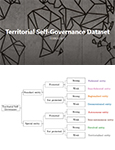 The Territorial Self-Governance Dataset (TERRGO) dataset was developed by Christoph Trinn and Felix Schulte from the Institute of Political Science, Heidelberg University. It takes a fresh look at territorial self-governance in more than 2,900 second-level regions in 96 Western and non-Western democracies, semi-democracies and autocracies; provides information on each generic category of self-governance units; makes available data for each individual unit; builds on a parsimonious conceptualization of territorial self-governance; allows to untangle country-specific profiles. See all details… The Territorial Self-Governance Dataset (TERRGO) dataset was developed by Christoph Trinn and Felix Schulte from the Institute of Political Science, Heidelberg University. It takes a fresh look at territorial self-governance in more than 2,900 second-level regions in 96 Western and non-Western democracies, semi-democracies and autocracies; provides information on each generic category of self-governance units; makes available data for each individual unit; builds on a parsimonious conceptualization of territorial self-governance; allows to untangle country-specific profiles. See all details…
New report: "The Åland Example in Use 1990-2019: Where, When, How, Why and by Whom?" 2 July 2020 (Mariehamn, Finland)  In the 1920s, a dispute between Finland and Sweden over the Åland Islands was peacefully resolved through a compromise which included autonomy, minority protection, as well as demilitarisation and neutralisation for the islands. This new report by Susann Simolin (Åland Islands Peace Institute) maps 25 conflicts in which the Åland example has been used and analyses eight of them in more depth. It discusses the questions of where, when, how, who, and why the Åland example has been used in conflict resolution efforts around the world as well as what has been of interest. Read more… In the 1920s, a dispute between Finland and Sweden over the Åland Islands was peacefully resolved through a compromise which included autonomy, minority protection, as well as demilitarisation and neutralisation for the islands. This new report by Susann Simolin (Åland Islands Peace Institute) maps 25 conflicts in which the Åland example has been used and analyses eight of them in more depth. It discusses the questions of where, when, how, who, and why the Åland example has been used in conflict resolution efforts around the world as well as what has been of interest. Read more…
News Archive
|
|
Tracy B. Fenwick and Andrew C. Banfield (eds), Beyond Autonomy. Practical and Theoretical Challenges to 21st Century Federalism, Series "Studies in Territorial and Cultural Diversity Governance, Volume 12", Brill Nijhoff, 2021
 This edited volume forces us to rethink the meaning of autonomy as a central
organising pillar of federalism. Can federations exist beyond the autonomy
realm designed to promote territorial self-governance and direct representation
among various levels of government? [...] How do newly emerging federations in Africa and Asia design
federal institutions in order to decrease conflict while promoting national
solidarity? How can federal systems protect the rights of non-territorial
minorities such as many indigenous peoples? Read more... This edited volume forces us to rethink the meaning of autonomy as a central
organising pillar of federalism. Can federations exist beyond the autonomy
realm designed to promote territorial self-governance and direct representation
among various levels of government? [...] How do newly emerging federations in Africa and Asia design
federal institutions in order to decrease conflict while promoting national
solidarity? How can federal systems protect the rights of non-territorial
minorities such as many indigenous peoples? Read more...
Soeren Keil and Allison McCulloch (eds.), Power-Sharing in Europe. Past Practice, Present Cases, and Future Directions, Palgrave Macmillan, 2021
 This book evaluates the performance of consociational power-sharing arrangements in Europe. Under what conditions do consociational arrangements come in and out of being? How do consociational arrangements work in practice? The volume assesses how consociationalism is adopted, how it functions, and how it reforms or ends. Chapters cover early adopters of consociationalism, including both those which moved on to other institutional designs (the Netherlands, Austria) as well as those that continue to use consociational processes (Belgium, Switzerland, South Tyrol). Also analysed are cases where consociationalism was adopted after violent internal conflict (Bosnia and Herzegovina, Kosovo, North Macedonia, Northern Ireland) and cases of unresolved conflict where consociationalism may yet help mediate ongoing divisions (Cyprus, Spain). Read more... This book evaluates the performance of consociational power-sharing arrangements in Europe. Under what conditions do consociational arrangements come in and out of being? How do consociational arrangements work in practice? The volume assesses how consociationalism is adopted, how it functions, and how it reforms or ends. Chapters cover early adopters of consociationalism, including both those which moved on to other institutional designs (the Netherlands, Austria) as well as those that continue to use consociational processes (Belgium, Switzerland, South Tyrol). Also analysed are cases where consociationalism was adopted after violent internal conflict (Bosnia and Herzegovina, Kosovo, North Macedonia, Northern Ireland) and cases of unresolved conflict where consociationalism may yet help mediate ongoing divisions (Cyprus, Spain). Read more...
Tove H. Malloy and Levente Salat (eds.), Non-Territorial Autonomy and Decentralization Ethno-Cultural Diversity Governance, Routledge, 2020
 This volume describes and analyzes alternative and emerging models of non-territorial autonomy (NTA), particularly in relation to decentralization. The authors push the NTA debate in new directions by offering a re-conceptualization based on ethno-cultural bottom-up decentralized action that redefines autonomy into its true sense of autonomous action. The authors explore two approaches to political decentralization which add to the theoretical debate on NTA – network governance, which focuses on new dynamics in policy processes, and normative pluralism, which focuses on accommodating the distinctness of the groups through the subsidiarity principle with regard to their own affairs. The book explores the potential ramifications of ethno-cultural NTA institutions acting within the wider framework of state institutions and assesses the functions of these institutions as another dimension of decentralization and thus another 'layer' of democracy. Read more… This volume describes and analyzes alternative and emerging models of non-territorial autonomy (NTA), particularly in relation to decentralization. The authors push the NTA debate in new directions by offering a re-conceptualization based on ethno-cultural bottom-up decentralized action that redefines autonomy into its true sense of autonomous action. The authors explore two approaches to political decentralization which add to the theoretical debate on NTA – network governance, which focuses on new dynamics in policy processes, and normative pluralism, which focuses on accommodating the distinctness of the groups through the subsidiarity principle with regard to their own affairs. The book explores the potential ramifications of ethno-cultural NTA institutions acting within the wider framework of state institutions and assesses the functions of these institutions as another dimension of decentralization and thus another 'layer' of democracy. Read more…
Journal of Autonomy and Security Studies (JASS), Volume 4, Issue 1, September 2020

The Journal of Autonomy and Security Studies is a peer-reviewed, open access e-journal published by the Åland Islands Peace Institute. The journal addresses its overarching theme of peace and security from the perspectives of autonomy, demilitarization, and minority protection. Each issue of JASS includes scholarly articles that in some way deal with the subjects mentioned above. JASS issues may also include other types of material such as project notes, book reviews, and information on pending conferences. Read more...
Special issue "Federalism as a Tool of Conflict Resolution". Guest Editors: Soeren Keil and Elisabeth Alber, Ethnopolitics, Vol. 19, Issue 4, July 2020
 Paul Anderson discusses how the end of Spain's decentralization process as a result of the Spanish Constitutional Court's decision on the new Catalan autonomy statute was a watershed moment in which Catalan autonomy demands began to transform into independence demands. Francesco Palermo discusses how decentralization is an element of conflict resolution in Ukraine, but one which is politically charged. Eva Maria Belser argues that the absence, not the failure, of functioning federalism explains some of the shortcomings of political stability and internal peace in Iraq. Johann Wolfschwenger and Kirsten Saxinger compare the autonomy of Gagauzia and the Transnistrian settlement process in Moldova's experience with decentralization as a tool of conflict resolution. Karl Kössler highlights the complicated relationship between conflict, autonomy and secession requests in Bougainville. Joseph Marko discusses the theoretical and methodological difficulties in the conceptualization of multinational federalism at the interface of law and political science. He offers a new approach called "multiple diversity governance". Read more… Paul Anderson discusses how the end of Spain's decentralization process as a result of the Spanish Constitutional Court's decision on the new Catalan autonomy statute was a watershed moment in which Catalan autonomy demands began to transform into independence demands. Francesco Palermo discusses how decentralization is an element of conflict resolution in Ukraine, but one which is politically charged. Eva Maria Belser argues that the absence, not the failure, of functioning federalism explains some of the shortcomings of political stability and internal peace in Iraq. Johann Wolfschwenger and Kirsten Saxinger compare the autonomy of Gagauzia and the Transnistrian settlement process in Moldova's experience with decentralization as a tool of conflict resolution. Karl Kössler highlights the complicated relationship between conflict, autonomy and secession requests in Bougainville. Joseph Marko discusses the theoretical and methodological difficulties in the conceptualization of multinational federalism at the interface of law and political science. He offers a new approach called "multiple diversity governance". Read more…
Felix Schulte, Peace through Self-Determination. Success and Failure of Territorial Autonomy, Palgrave Macmillan, 2020
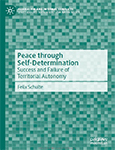 Bringing together comparative politics, conflict research and social psychology, this book presents a novel theory to explain the consolidation outcomes of post-conflict autonomy arrangements. The author concludes that elites accept autonomy reforms if they promise a high degree of self-determination and, at the same time, ethnic recognition is not hindered by horizontal inequalities. Bargaining efforts succeed within inclusive institutions involving non-nationalist parties and international organizations. Autonomy reforms fail if the degree of self-rule offered is too low and strong inequalities generate new grievances. Autocratic rule, nationalist parties, and a lack of international attention provide a breeding ground for further centrifugal activities. Read more... Bringing together comparative politics, conflict research and social psychology, this book presents a novel theory to explain the consolidation outcomes of post-conflict autonomy arrangements. The author concludes that elites accept autonomy reforms if they promise a high degree of self-determination and, at the same time, ethnic recognition is not hindered by horizontal inequalities. Bargaining efforts succeed within inclusive institutions involving non-nationalist parties and international organizations. Autonomy reforms fail if the degree of self-rule offered is too low and strong inequalities generate new grievances. Autocratic rule, nationalist parties, and a lack of international attention provide a breeding ground for further centrifugal activities. Read more...
Natascha S. Neudorfer, Ulrike G. Theuerkauf and Stefan Wolff, "Territorial self-governance and proportional representation: reducing the risk of territory-centred intrastate violence", Territory, Politics, Governance, June 2020
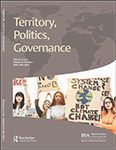 This article argues that the effectiveness of territorial self-governance as a tool of territory-centred conflict management increases when combined with a proportional representation (PR) electoral system for the national legislature in basically open political regimes, but not when combined with a parliamentary form of government at the centre. The authors propose that the combination of territorial self-governance and PR in at least minimally democratic regimes has most conflict-reducing potential, as both institutions follow a logic of widening the input side of representative politics. Their findings highlight the need to consider not just the number but, more importantly, the type of power-sharing institutions that are combined with each other when looking for ways to reduce the risk of territory-centred intrastate violence. Read more... This article argues that the effectiveness of territorial self-governance as a tool of territory-centred conflict management increases when combined with a proportional representation (PR) electoral system for the national legislature in basically open political regimes, but not when combined with a parliamentary form of government at the centre. The authors propose that the combination of territorial self-governance and PR in at least minimally democratic regimes has most conflict-reducing potential, as both institutions follow a logic of widening the input side of representative politics. Their findings highlight the need to consider not just the number but, more importantly, the type of power-sharing institutions that are combined with each other when looking for ways to reduce the risk of territory-centred intrastate violence. Read more...
Special Issue "National Cultural Autonomy in Diverse Political Communities: Practices, Challenges, and Perspectives", Nationalities Papers, Vol. 48, Special Issue 2, March 2020
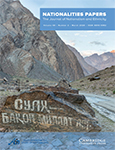 David J. Smith discusses the politics of nonterritorial autonomy in present-day Estonia. Judit Molnar Sansum and Balázs Dobos reflect upon how domestic and international factors intersected to shape Hungary's legislation on national-cultural autonomy. Katinka Beretka focuses on Serbia's National Minority Councils. Balázs Dobos offers a systematic analysis of election procedures for nonterritorial autonomy institutions in Croatia, Estonia, Hungary, Serbia and Slovenia. Federica Prina discusses the operation of nonterritorial autonomy in the case of the Russian Federation. Stéphanie Marsal outlines the experience of nonterritorial autonomy as seen from the standpoint of the OSCE High Commissioner on National Minorities. Cengiz Gunes's article on approaches to Kurdish autonomy in the Middle East deals with Iraq, Syria, and Turkey. Ephraim Nimni argues for a shift towards a single, binational state solution for the Israel-Palestine conflict based on principles of shared sovereignty, national cultural autonomy, and collective rights. Read more… David J. Smith discusses the politics of nonterritorial autonomy in present-day Estonia. Judit Molnar Sansum and Balázs Dobos reflect upon how domestic and international factors intersected to shape Hungary's legislation on national-cultural autonomy. Katinka Beretka focuses on Serbia's National Minority Councils. Balázs Dobos offers a systematic analysis of election procedures for nonterritorial autonomy institutions in Croatia, Estonia, Hungary, Serbia and Slovenia. Federica Prina discusses the operation of nonterritorial autonomy in the case of the Russian Federation. Stéphanie Marsal outlines the experience of nonterritorial autonomy as seen from the standpoint of the OSCE High Commissioner on National Minorities. Cengiz Gunes's article on approaches to Kurdish autonomy in the Middle East deals with Iraq, Syria, and Turkey. Ephraim Nimni argues for a shift towards a single, binational state solution for the Israel-Palestine conflict based on principles of shared sovereignty, national cultural autonomy, and collective rights. Read more…
Further Readings
|
